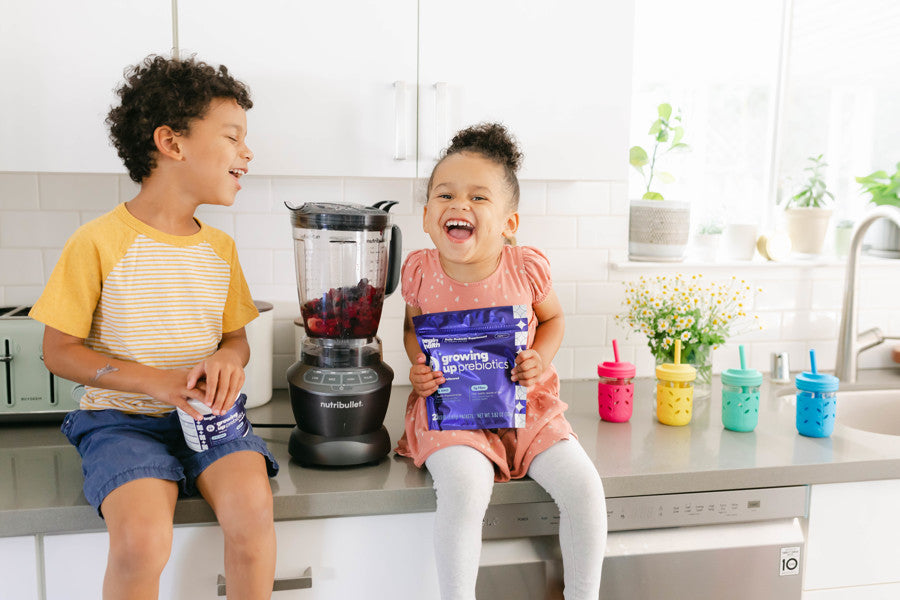Your Cart is Empty
Continue shoppingHow Physical Therapy Helps Constipated Kids
Medically reviewed by Christine Stephenson | Published January 04, 2024
share this article

When I decided to go to PT school, I knew I wanted to work with kids. I pictured helping a kid learn to walk on a prosthetic leg, getting a teen with developmental disabilities on a bike, helping little ones build endurance so they can keep up with their friends on the playground. Twenty years later, I get to do all of these things. But what makes this my dream job is a practice area that I didn’t even know existed when I started out on my PT journey: helping kids manage chronic constipation.
If you are like most parents of constipated kids, you probably did a double take when you read that. Physical therapy for constipation? What in the world? Turns out, physical therapists can be a key component to treating chronic constipation. Let’s review the benefits of physical therapy for kid’s constipation.
How the Body Changes with Chronic Constipation
More than 95% of constipation in kids is called “functional constipation,” meaning that it is not caused by a disease or a structural abnormality. For most kids, constipation begins with withholding: not wanting to have a bowel movement because they are too busy, it might hurt, or they don’t like the sounds or smells in the bathroom, etc.
When your kiddo has been holding onto poop in their rectum, their body will start to accommodate that poop, leading to these muscle changes:
-
The muscles of the pelvic floor, which have to relax during a bowel movement, tighten up to hold the poop in. They can stay tight even when your kid is bearing down - a condition called pelvic floor dyssynergia.
-
The smooth muscle of the rectum, which has to contract to push poop out, weakens and becomes less effective. Similarly, the colon can get stretched out from backed up stool and become less effective at moving stool through.
-
The belly muscles sometimes stretch out to accommodate the back-up of stool in the large intestine. This weakens the belly muscles and can make the colon less efficient.
-
The resting position of the spine might change, which changes the position of the diaphragm and makes it harder for kids to effectively bear down to push out poop.
How can Physical Therapy Help?
Pelvic floor physical therapists have so many tools in their toolboxes to help constipated kids:
-
Biofeedback is one of the most effective interventions we use. This involves putting small electrodes (similar to the stickers put on the chest to assess heart function) on the skin near the anus. The electrodes read muscle activity and help us determine if the muscles are weak, tight, or lack coordination. If a child needs to re-learn how to use the pelvic floor muscles, we use simple games on a computer screen to help them learn.
-
Core strengthening is often required to help tighten up the abdominal muscles so the colon can work more effectively.
-
Abdominal massage can be effective at moving stool through the colon when the colon itself isn’t working optimally.
-
Postural retraining teaches kids how to sit on the toilet in the most effective manner to have a quick, complete bowel movement.
-
Body awareness teaches kids how to recognize when they are under stress and how that might affect their bowel movements. This will also help kids learn to recognize the ways their bodies signal that they need to poop.
What does a Physical Therapy Session look like?
Pelvic floor dysfunction is when the pelvic floor muscles are too tight to let poop out or too weak to hold it in. Physical therapists who are trained in pelvic floor dysfunction will do a thorough evaluation to assess what body structures and behaviors are contributing to constipation. Depending on the results, each follow-up session will be customized with the above interventions to meet each kid’s needs. And you can expect homework as parents as well - I spend a lot of time during therapy sessions teaching a kid what to do on the toilet when they are trying to poop. This only works if each kiddo is actually practicing it at home, when they have an urge. I often tell my kiddos that I am the coach, their caregivers are the assistant coaches, and they are the players on the field. Only the players get to score the goal - and in this case, have a nice daily bowel movement!
Daily reads to help your little ones lead happier and healthier lives.
Buy Now
Join the
Happy Gut Club
Summary
Constipation is multifactorial and from a long list of possible causes such as withholding, poor diet, decreased hydration, lack of exercise, stress and trauma, or low muscle tone. Physical therapy sessions can help a kid's constipation by strengthening the core, applying postural training and body awareness, and implementing abdominal massages for relief. Research shows that partnering with a physical therapist who specialize in bowel dysfunction significantly improves outcomes for kids. We are definitely a professional you want on your side during this sometimes long and frustrating journey!

Author
Christine Stephenson
Trending

How to Transition Kids Off Stool Softeners Safely
read now
How to Know If Your Kid Needs a Stool Softener (or Something Else)
read now
Why Parents Are Choosing Prebiotics Over Stool Softeners for Kids
read now






